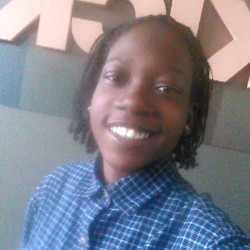BY AJ TRAGER
 Kunto Howard, 24, project coordinator for "Breaking The Cycle," a program of LGBT Detroit, is working to help people stop smoking. Howard says smoking rates are significantly higher in the LGBT population. Aggressive marketing along with stress from stigma and prejudice for LGBT people adds to the problem.
Kunto Howard, 24, project coordinator for "Breaking The Cycle," a program of LGBT Detroit, is working to help people stop smoking. Howard says smoking rates are significantly higher in the LGBT population. Aggressive marketing along with stress from stigma and prejudice for LGBT people adds to the problem. DETROIT – Tobacco use remains the single largest preventable cause of death and disease in the U.S. According to the Center for Disease Control it kills more than 480,000 Americans each year. Among LGBT individuals smoking is significantly higher than their heterosexual counterparts. In a 2013 study conducted by the CDC, the prevalence of smoking in the LGBT community was 26.6 percent compared with 17.6 percent of heterosexuals. Many believe aggressive marketing of tobacco products to the LGBT community and the prevalence of added stressors from prejudice and stigma are why smoking rates are higher.
LGBT Detroit, formally known as KICK, is committed to lowering the smoking rates of LGBT individuals in the Motor City. Kunto Howard, 24, project coordinator for "Breaking The Cycle," joined the organization two years ago.
Through data based research, Breaking The Cycle addresses issues of substance abuse and recovery in the LGBT community and provides educational forums and small group sessions to create spaces where individuals can conquer addictions. Breaking the Cycle is a state of Michigan licensed program for substance abuse focusing on nicotine replacement therapy.
Howard says smoking rates for the LGBT community in Detroit are 50 percent higher than the general population, with people living with HIV smoking at rates 70 percent higher than the general population, with many factors attributing to the higher rates of use by the LGBT community.
"It's a big disparity. A lot of people don't even know that we are a targeted community, because we have an entirely different set of stressors. These tobacco campaigns are not our friends and they don't care about our health – they care about us buying into their industry. They integrate our culture with tobacco ad messaging. And that's another way I try to combat tobacco use. I show the pros and cons with tobacco ads messaging and how it affects our community," says Howard.
LGBT Detroit has partnered with AIDS service organizations in the area as well as CHAC, Teen HYPE, AIDS Partnership Michigan, Michigan AIDS Coalition and is currently working on opening up more services to local high schools and universities.
Quitting
It's generally difficult to quit smoking based on physical and mental withdrawal symptoms. When discussing how to quit, Howard highlights behavioral strategies to help people become more aware of their habits and routines and makes a point to discuss lifestyle changes.
"Habits are hard to break, and as human beings we are habitual people. So my way of getting smoking down in the LGBT community is to come from a social support system," Howard says.
Howard helps each individual plan out their day and identify what activities can be substituted for smoking. Howard asks questions like: Why do you need a cigarette? Who were you with when you last had one? Can you count to 10 and see if you still need a smoke? What activities can you substitute while in the car and you want a smoke?
Part of the program looks at how to prevent a soon to be ex-smoker from falling off the wagon and buying another pack.
According to the CDC, smoking-related illnesses in the U.S. cost more than $300 billion a year, including nearly $170 billion in direct medical care for adults and $156 billion in lost productivity. Smoking increases the risk of contracting lung cancer, heart disease, chronic bronchitis and other smoking-related diseases.
Howard explains that each subset of the LGBT community experiences different rates of smoking. "We all go through our separate disparities."
Within the LGBT community, bisexuals smoke at much higher smoking rates than lesbians or gays. Howard believes visibility plays a big role in this.
"When you don't have as much visibility, there are a lot of things that affect that – the mental issues, feeling alone and depressed and feeling like you don't necessarily fit into a community. Bi-attractional isn't an identity that is taken seriously. And if you think about the reasons, there are different reasons, but they all still deal with stigma. We do have stigma within our own community," Howard stresses. "We are talking about cessation and prevention. But with that conversation starting and moving all the way down to stigma, health, disparity and social disparities, all of these things are intertwined and intersect with one another."
Two months ago Howard quit smoking Black & Milds. Howard had a health scare including an irregular heart beat. They decided that enough was enough and quit smoking. The added risks of smoking were not worth whatever positives Howard experienced from it.
"My life is worth it. I didn't come into this world as a codependent from smoking or any substance, and I'm not going to let it lead my life. I'm only 24 and I want to see 34," Howard explained. "I want to see life. Tobacco is not going to win. Addiction is not going to win."
Howard believes that pursuing personal research and education helped cut down cravings – even leading to the decision to not light up at all. Taking a puff is often about managing stress, but Howard believes nicotine tricks the brain.
For many, the decision to quit is not as clear cut as it was for Howard. And one has to want to quit in order to succeed at cessation. But a good, strong support system is always beneficial, especially for something as difficult as quitting smoking.
"It's not a one day thing. Rome wasn't buit in a day. Even now, for me, I still have cravings. Habits can really be embedded in us in ways that we have no idea until we start looking at it," Howard said.
According to Howard, the best way to help someone who is attempting to quit is to offer continuous support and to celebrate the successes along the way. However, if they do fall back into the cycle, Howard advises reminding loved ones that even one day without a smoke is a success.
Follow LGBT Detroit's campaign to Break The Cycle on their Facebook and on Twitter by searching for the hashtag #BreakingTheCycle. LGBT Detroit holds bi monthly meetings about tobacco use and prevention every first and third Monday from 6-8 p.m.
LGBT Detroit is located at 41 Burroughs St., Suite 109 in Detroit. For more information, contact Howard at 313-285-9733 or by email at [email protected].










